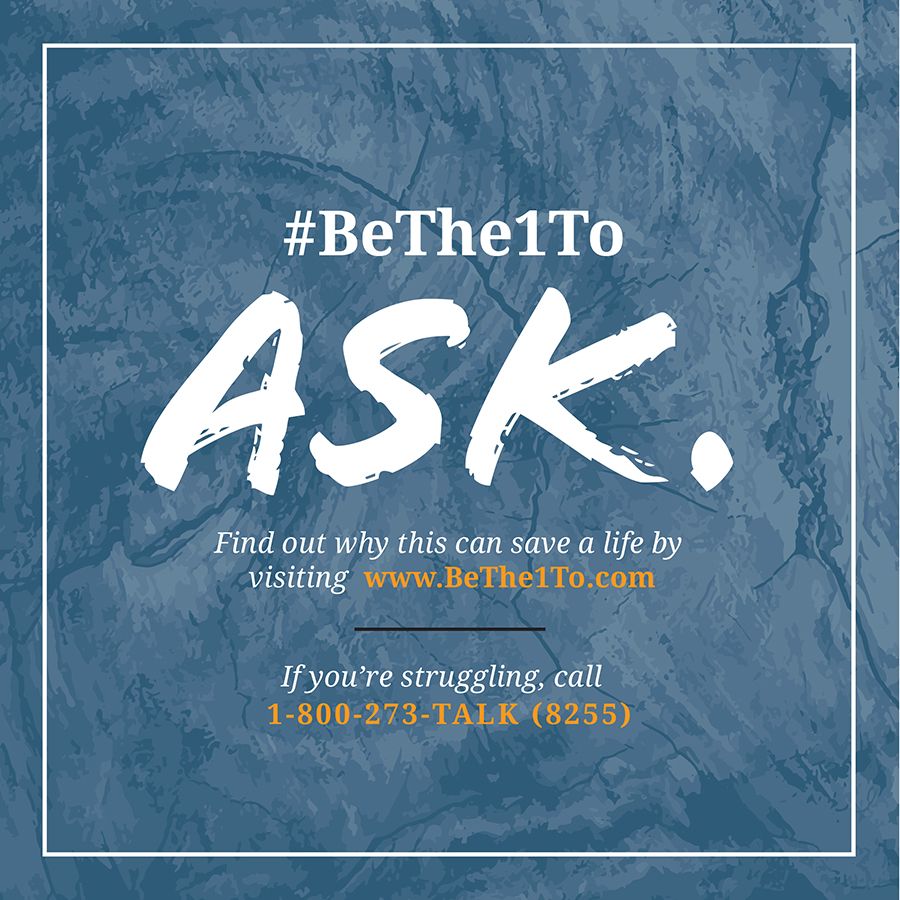
The WCC Personal Counseling Department sent the following information to all current students as part of its monthly "Mind Your Mental Health" email campaign.
September is Suicide Prevention Month. At Washtenaw Community College, we challenge
you to participate in the #BeThe1To campaign. It details the five evidence-based steps that any individual can take to help someone
that is in suicidal crisis, as well as stories of recovery.
These five action steps can help someone who is suicidal:
ASK
Asking the question, "Are you thinking about suicide?" communicates that you're open to speaking about suicide in a non-judgmental and supportive way. Asking in this direct, unbiased manner, can open the door for effective dialogue about their emotional pain and can allow everyone involved to see what next steps need to be taken. Other questions you can ask include, "How do you hurt?" and "How can I help?" Do not ever promise to keep their thoughts of suicide a secret. Studies show that asking at-risk individuals if they are suicidal does not increase suicides or suicidal thoughts. In fact, studies suggest the opposite: findings suggest acknowledging and talking about suicide may in fact reduce rather than increase suicidal ideation.
BE THERE
This could mean being physically present for someone, speaking with them on the phone when you can, or any other way that shows support for the person at risk. Listening is again very important during this step — find out what and who they believe will be the most effective sources of help. Being there for someone with thoughts of suicide is life-saving. Increasing someone's connectedness to others and limiting their isolation (both in the short- and long-term) has shown to be a protective factor against suicide.
KEEP THEM SAFE
First of all, it's good for everyone to be on the same page. After the "Ask" step, and you've determined suicide is indeed being talked about, it's important to find out a few things to establish immediate safety. Have they already done anything to try to kill themselves before talking with you? Does the person experiencing thoughts of suicide know how they would kill themselves? Do they have a specific, detailed plan? What's the timing of their plan? What sort of access do they have to their planned method? Knowing the answers to each of these questions can tell us a lot about the imminence and severity of danger the person is in. If they have immediate access to a firearm and are very serious about attempting suicide, then extra steps (like calling the authorities or driving them to an emergency department) might be necessary. The Suicide Lifeline (800-273-8255) can always act as a resource during these moments, as well, if you aren't entirely sure what to do next.
HELP THEM CONNECT
Helping someone with thoughts of suicide connect with ongoing support (like the Lifeline, 800-273-8255) can help them establish a safety net for those moments they find themselves in a crisis. Additional components of a safety net might be connecting them with supports and resources in their communities. Explore some of these possible supports with them — are they currently seeing a mental health professional? Have they in the past? Is this an option for them currently? Are there other mental health resources in the community that can effectively help? One way to start helping them find ways to connect is to work with them to develop a safety plan. The My3 app is a safety planning and crisis intervention app that can help develop these supports and is stored conveniently on your smartphone for quick access.
FOLLOW UP
After your initial contact with a person experiencing thoughts of suicide, and after you've
connected with the immediate support systems they need, make sure to follow up with
them to see how they're doing. Leave a message, send a text, or give them a call.
The follow-up step is a great time check in with them to see if there is more you
are capable of helping with or if there are things you've said you would do and haven't
yet had the chance to get done for the person. Studies have shown a reduction in the
number of deaths by suicide when following up was involved with high-risk populations after they were discharged from acute care services.
